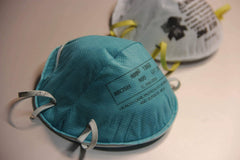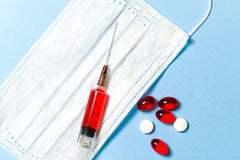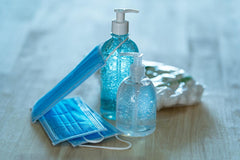Face Mask for Farming provided by FluShields
 Photo from John Lambeth from pexels
Photo from John Lambeth from pexels
The number of agricultural masks and respirator options can be daunting. How do you know which one you should use for what purpose?
Face Masks can Protect Farmworkers
Respirators and other face masks are frequently used in agriculture and, depending on the job, a particular face mask is usually required. To know the mask you want to use, consider what kinds of masks are available and what letters and numbers on masks mean. Failure to provide yourself with the appropriate personal protective equipment ( PPE) as shown on the label can be harmful to health and, in certain situations, unlawful.
Hundreds of thousands of farm employees in the United States regularly experience pesticides at work. And some of the most commonly used pesticides in the United States face significant health hazards, ranging from workplace asthma to respiratory distress to death. Epidemiological trials, including a long-term survey of over 80,000 licensed pesticides applicators undertaken by the National Institutes of Health, have identified connections between pesticides and respiratory disorders, ranging from acute symptoms such as dry throat, trouble breathing, chest pain, coughing, and wheezing to chronic diseases such as reduced lung function, occupational asthma, chronic obstructive pulmonary disease, and lung cancer.

Another research by the National Institute for Occupational Safety and Health showed that farmworkers had dramatically increased mortality due to a variety of respiratory problems, including hypersensitivity to pneumonia (also known as "farmer's lung"), asthma, bronchitis, and pneumonia. Masks may be essential to minimize the danger.
Good news: You can actually protect yourself as much as possible by wearing an N95 respirator mask: Get your N95 respirator masks for the whole family today.
Many farmers, particularly those working with pesticides, wear N95 or KN95 face masks. These face masks are made of non-woven polypropylene fibers and comply with specific regulatory requirements for the filtering of particles and droplets as small as 0.3 microns or three-thousandths of a milimeter. These are also part of a larger PPE package that may provide respiratory protection, gloves, headgear and body safety, foot, and eye protection. U.S. legislation allows employers to provide sufficient PPE to employees who handle pesticides.
The type of protective equipment required is determined by the level of toxicity of the pesticide substance for five types of acute exposure — oral, dermal, inhalation, eye irritation, and skin irritation — as well as whether it is steam, solid or liquid, and whether the work is performed outdoors or in enclosed areas.
Air-purifying respirators (APRs) are most widely used on farms. APRs remove contaminants from the surrounding air via purifying components called particulate filters and chemical cartridges/canisters.
There Are Three Types Of Air-Purifying Respirators:
Filtering Facepiece Respirators (FFRs)
Often referred to as disposable respirators, these masks form a close shield across the nose and mouth of the user with a barrier to eliminate the contaminants while the air is inhaled through the facepiece. FFRs are obsolete and can be thrown out if they can no longer be used. Since FFRs use a filter, this form of respirator is not designed to protect against gasses and vapors. Respirators are graded on the basis of filtration capacity: the number of particles to be eliminated, three forms of oil resistance; for example, class P99 FFR eliminates at least 99 percent of airborne particles and is extremely resistant to oil.
Elastomeric Facepiece Respirators
Elastomeric respirators are reusable PPE devices that use cartridges or filters to shield workers from gases, vapors, or particles. These filters and cartridges are replaceable and can be swapped out for protection against specific chemicals or other hazards. Elastomeric facepiece and quarter facepiece respirators protect the user's nose and mouth with a strong seal while the elastomeric full-facepiece respirator provides a transparent plastic eye patch to shield the wearer from toxic splashes or harmful vapors.
Powered-Air Purifying Respirator (PAPRs)
PAPR is a battery-powered respirator that pulls air through a filter or cartridge and filters it until it enters the inhalation airstream of the user. These respirators are known to have a high degree of safety relative to non-powered alternatives and a lower breathing resistance making them more convenient for the user. PAPRs come in both tight and relaxed face masks and are usually added to a HazMat suit or a pair of coveralls. Loose-fitting PAPRs can be only as successful when combined with a hat or hood.
APRs that holds a cartridge can be either a half mask or a full face mask. Two-strap APRs that cover only the mouth and nose (such as the N95 mask) contain only filters and are considered removable so none of the components can be substituted. These masks are graded NIOSH for three levels of oil degradation resistance (N, R, and P) and three levels of filter efficiency (95, 99, and 100).
👇 FluShields donates 3% of every order you place. You can top, round up, or give as much as you fancy at checkout. Our team and our customers like you are proud to have...
Click the tiny info button for details 👆
The CDC now advises in Corona Times wearing cloth face coverings in situations where other social distance interventions are difficult to sustain, particularly in areas with severe community-based transmission with COVID-19. For agriculture, these may involve retail stores, and workplaces where workers are close together (such as the packaging area). Simple fabric face coverings will not do: they do not reduce the spread of the virus and do not protect the workers who work with somebody who may have the virus but does not know about it. One needs to wear an N95 mask with filters to protect him- or herself.
As the U.S. growing season starts, early estimates show that most farmers have the PPE they need for the time being. An N95 mask can be used for eight hours until it is discarded, but with a lack of masks that is unlikely to abate quickly, farmworkers are likely to be caught short. To date, only scant advice has been given by local agriculture authorities on how to resolve the shortage.
And what are the farmers and farm workers expected to do? Personal activities would rely on the crop and the pesticide substance, but there are some general recommendations. Only, since labels require the use of masks, farmers and farm workers should not be permitted to work without them. It's dangerous and also illegal.
Any dangerous pesticides are only permitted on the market because it is believed that the application of PPE can dramatically minimize toxicity. Improvised masks should not be used by pesticide supervisors either. Bandannas and other types of ordinary fabric worn over the nose and mouth do not filter toxic pesticide particles and droplets, and can also serve as a pesticide residue reservoir.
Consider alternate controls that minimize exposure to respiratory threats and thereby reduce dependency on personal protective equipment (PPE). Examples include:
- Avoid the process/task that produces dangerous dust or gases.
- Choose an alternative pesticide option that needs less PPE or PPE that you have available.
- Ventilate and monitor the dust at its source in order to minimize exposure to enclosed spaces.
- Employ an applicator or other contractor who has the PPE required.
And now everybody has to deal with the Coronavirus or COVID-19 as well. Also, farmers and farmworkers who are already exposed to pesticides. Especially now they should wear an N95 mask at all times.
Prevent exposure for everyone by:
- Reducing the number of farm employees who work together, group them, and try to work at different times.
- Reducing interaction between people on the farm, including during milking
- Just have the most important visitors on the farm
Practice proper hygiene in order to reduce the distribution of droplets in the air and decrease the chance of contaminating surfaces.
Prevent interaction with polluted surfaces
- COVID-19 can not multiply outside the body, but it can survive on the surface for a period of days. Think of common farm touchpoints and how sharing can be avoided.
- Hold your own equipment apart and clean your common equipment with detergent, water, disinfectant (at least 7 days).
- Quarantine devices and materials that come to the farm from outside or clean those that need to be treated shortly after arrival.
Millions of workers in many fields rely on N95 masks and other PPE masks for protection and health, including farmers and farmworkers who play a crucial role in feeding the planet. The recovery of PPE production may help to reduce the current scarcity, but I believe that researchers and governments should also strive to find and encourage effective alternatives to pesticides that require such PPE in the first place.
But, no matter where you are, what you work, and who you are with, you need to be aware of your surroundings. Always keep your face mask with a filter on when you are in a crowded place. Always do proper hygiene and follow the rules and regulations implemented in your workplace. We can stop the spread of the virus if we care for ourselves and others.
Good news: You can actually protect yourself as much as possible by wearing an N95 respirator mask: Get your N95 respirator masks for the whole family today.
Disclaimer: Please note that we can only pass on general information and cannot make any guarantees or be liable for any consequences of your decision making or behavior. Use good common sense and ask your healthcare provider or physician for advice.
Thanks for stopping by. Please leave your comments, ideas, or feedback below so we can continue to provide you with great content.






